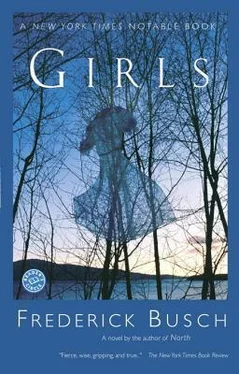William Franklin’s car, parked around the corner of a long clapboard bar, wasn’t empty like I’d thought. A head moved up in the front seat, on the passenger’s side, and then what I’d thought was a headrest began to move on the driver’s side. They had been engaging in recreation, and their posture suggested what it was. I felt a little jump in my own body. The doors opened and a short girl walked around the car to the driver’s side. Franklin got out and they embraced, leaning against the door he’d closed.
I had no authority to follow him or roust him, and I thought he’d come after me if I beat on him in front of his girlfriend. Then the local cops would come, and the state police, and I’d be in the shit, with nothing learned. I’d known this in advance, hadn’t I? So why, on a night so terrible for driving, had I driven here?
“You don’t know that,” I said, “you’re stupider than I thought.”
And because of the eyes in the wallpaper, Jack. I leaned forward to turn on my lights and shift into first, and my body ached like I’d been beaten by the kid I was about to start roughing up. Go home, I told myself, thinking about the wallpaper. You go home and go upstairs and you look back at them.

The dog and I were outside next morning, and as I watched him roll on his back, grinding at a piece of rabbit several decades old that he’d brought back as a trophy, Fanny wobbled over the crisp ice to park her car. He was up and waiting, paws on the door, his big brush of a tail wagging. I thought of the Labrador sniffing for the bomb they hadn’t found. There was this optimism in dogs. They got up and charged into the day with a confidence I wanted to have. Looking at the rabbit haunch, I was grateful my nostrils were sealed by the cold.
Fanny’s, apparently, weren’t. She held her nose.
“I think it goes back to Lyndon Johnson’s administration.”
With her hand away from her face, she said, “All those presidents smell the same to me.”
We stood in the deep cold and nodded in agreement.
“I have to go soon,” I said. “I’ve been getting in later and later, and I believe I’m going to be reprimanded. I needed to talk to you. Have you got a minute?”
“Have I got a minute,” she said. “You and I spend a dozen hours a day chasing after strangers to mop their blood up and rescue their vehicles and generally smooth the way—”
“Smoothing the way. That’s good.”
“That’s what we do. We’re utilities. Like electricity.”
“Smoothing the way. I can’t think of anything rough I’ve turned smooth.”
“Like goddamned sandpaper,” she said.
“The tears will freeze on your eyes,” I said.
“Except I’m not crying,” she said. “Come inside. Have I got a minute. God, Jack.” She was inside the door, reaching back to hold it open for me. The dog went in, and I followed. She stood in the mudroom with her coat halfway off her shoulders. “Have I got a minute. And we’re passing each other, going back and forth like little ferries. Where was it, before you reported to Fort Leonard Wood, and we got a week — where did we go, where the ferries kept going there and back, there and back?”
“Seattle.”
“Vashon-Seattle, Seattle-Vashon. They were going to Canada, right?”
“We stayed in a hotel you said didn’t have mice or rats because the boa constrictors ate them.”
She let her coat slide down her arms and back. It pooled on the floor around her feet. I picked it up.
“Jack. Yes. I’ve got a minute.” She stood in front of me with her arms hanging, her shoulders sloped. It was a perfect picture of exhaustion. I think she could have slept standing before me. I knew it wasn’t only fatigue from work. We were grinding each other away with a kind of friction that didn’t involve our touching each other.
I said, “You know the little kid who disappeared? The one they’re offering a reward on?”
“I see her face all day. Everyplace. It’s a terrible little face. It’s so open.”
“One of the professors hooked her parents up with me. He was talking to Archie Halpern and I guess Archie said something about me and the MPs and some of the work I did, so this professor decided he needed my help. The Tanners asked me to do something. I don’t know what to do.”
“Just talking to them is something. You’re doing it, I assume.”
“I don’t know. That’s what I wanted to talk to you about.”
“You know how they feel.”
“No, it isn’t the same.”
“It isn’t the same. But you know how they feel.”
I nodded, and I could swear she knew I was going to drop on her, because I heard her feet move, as if she had set them. I leaned over onto her. I let my head fall onto her shoulder where it runs up into the neck. It must have hurt. She winced. But I felt, all of a sudden, the way she had looked a moment before. I thought my bones couldn’t hold me anymore. We got locked up like that, my empty left hand and my right still holding her coat in a fist, both of them behind her now, one of her arms around the small of my back, the other on my arm, and each of us at the same time trying to let our weight go and hold each other up.
The dog heard her sniff, and he thumped his tail. It hit the washing machine behind her and made a resonating noise. He did it again.
I said, “Oh boy.”
He probably thought I said, “Good boy,” because he slammed his tail against the washer.
Fanny said, “Poor, poor people.”
“Poor people,” I said.
Fanny said, “I was referring to us.”
She stepped out from under me, and I moved away. We avoided each other’s eyes.
“Listen,” I said. “A thing happened yesterday. Did you hear about the runaway girl?”
“They brought her over for a physical. They were sending her home. Yonkers, New York. She’d been gone for months, and then she lost some diddly job she shouldn’t have been given in the first place and she ended up here.”
“Sleeping at school.”
“You found her?”
“Yeah. She didn’t think I was doing her a service.”
“How’d you know about her?”
“I saw her on one of those supermarket milk cartons.”
“We don’t drink milk,” Fanny said. She went to the refrigerator and she opened the door. “See?” she said. “No milk. You never go into the supermarket. So why would you notice a milk container in the market, Jack?”
“I went in there one time, I guess. I guess I noticed them. How can I go in there and not notice them?”
“This does not help, Jack.”
“It helped her parents. But listen — there was something she said I wanted to ask you about.”
“They did a physical on her. Whatever he did had healed. She’d been gone awhile.”
“You think he did it? Her father? ”
“You are not a guard at a nursery school, Jack. You know about these things.”
“But I had to send her back, right?”
Fanny sat at the kitchen table. Her chin was in her palm, her elbow was on the table, and she looked more tired than anyone I’d seen since the war.
I said, “Right?”
She might have moved her head. I couldn’t tell.
“Am I nuts, Fanny?”
“Sometimes — I don’t know. Maybe I’m crazy. Maybe we’re both crazy and our marriage went crazy and the only sane thing in our lives is a dog. That’s what I sometimes think.”
I remembered, once, telling her how fortunate we were not to keep a gun in the house, because one of us would use it for sure on the other someday. She’d reminded me we did have a gun in the house and I had to admit I thought I’d kept it hidden from her.
Читать дальше











